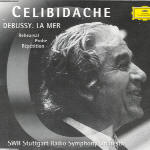In Debussy’s Nocturnes Sergiu Celibidache lets the clouds of Nuages drift by at a dreamily slow pace, conjuring up a lazy summer afternoon, while he turns the central march episode of Fêtes into a miniature Pines of the Appian Way. Sirènes is the lodestone of this performance, however. The startlingly slow tempo (Boulez with the Cleveland Orchestra on DG sounds breathless by comparison) puts you into an almost trance-like state, from which you can luxuriate in Debussy’s exquisite harmonies as the female chorus alternates between the “oo” and “ah” vowels, adding to the angelic atmosphere you wish would never end–that is, if you’re into this sort of thing.
Celibidache’s La Mer leans more toward the romantic era than the impressionistic, with measured tempos (except for a very swift climax to “Jeux de vagues”) and lush, full sonorities. While he certainly doesn’t make you smell the sea salt in the air the way Boulez does, Celibidache nonetheless presents a beautifully colored aural canvas.
The second disc begins with an Ibéria that is more or less ruined by emaciated sound and glacially slow tempos in “La parfums de la nuit”, here sounding more like an all night stakeout. Turning to Ravel, we are surprised by the dancing lightfootedness exhibited by this conductor who was better known for his elongated sense of time. Alborada del gracioso shakes and explodes like so much popcorn, as does the “Fandango” from Rapsodie espangole.
Things don’t proceed as smoothly on the third disc. While the Daphnis et Chloé Suite No. 2 revels in vivid colors, both La Valse and Le Tombeau are bogged down by Celibidache’s unconventional sound conception that emphasizes soft attacks, muted accents, and blurred bar lines. Thus, La Valse’s many tutti passages cannot penetrate the impressionistic haze, and Le Tombeau’s sonorities are so over-blended that I’m reminded of a jar of peanut butter and jelly swirl. (The trumpet in Rigaudon is virtually inaudible). DG has included a “bonus” disc that features 48 minutes of Celibidache rehearsing La Mer (in German), an item of interest only to devoted fans. The sound on these broadcast studio recordings is uniformily hissy and harsh in the climaxes. If this conductor intrigues you, there’s plenty here to ponder.
































